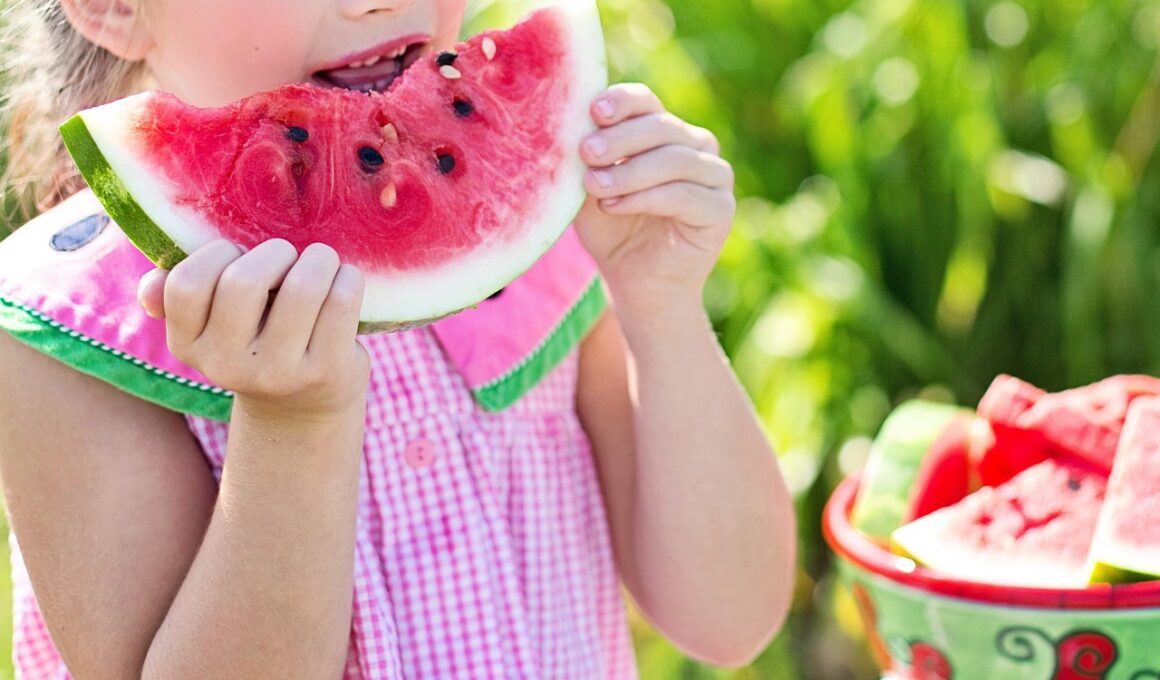Kids’ Healthy Snack Choices for Maintaining a Healthy Weight
Choosing healthy snacks is essential for children, particularly when it comes to maintaining a healthy weight. Parents can play a significant role by offering nutritious options at home and on-the-go. Instead of reaching for sugary treats or processed snacks, consider alternatives that provide necessary nutrients without excess calories. Value-filled choices help children feel satisfied without contributing to weight gain, making it easier to maintain a balanced diet. Nutrient-rich snacks, such as fruits, vegetables, and whole grains, are fantastic options. Creative presentation can also encourage kids to eat healthy. For instance, fruits can be cut into fun shapes, while vegetables can be served with hummus or yogurt dip. To help kids avoid unhealthy snacks, set a schedule for snacking. This ensures they won’t overindulge and develop a habit of reaching for junk food. Additionally, educating children about healthy eating can empower them to make better decisions regarding their snacks. Incorporating healthy choices regularly can foster lifelong healthy eating habits. For instance, children can join in snack preparation, creating excitement around healthy eating while learning cooking skills. It’s not just about satisfying hunger; it’s about nourishing the body.
Healthy protein options are sometimes overlooked when considering kids’ snacks. Protein-rich snacks provide essential amino acids necessary for growth and vitality. Foods like yogurt, nuts, and cheese are not only delicious but also fulfilling and beneficial. Instead of indulging in chips or candy bars, children can enjoy a handful of almonds, providing them with healthy fats and protein. Alternatively, low-fat string cheese or Greek yogurt can be appealing as quick snacks that pack a punch in nutrition. Smoothies can be another delightful option; blending fruits, milk, or yogurt can create a refreshing drink, ensuring ample hydration and energy. Adding a scoop of nut butter can enhance the flavor and offer additional protein. Incorporating these protein-packed snacks will help kids stay energized and satisfied throughout the day. Educating kids on the benefits of protein can make them more inclined to choose these healthier options. You may even engage in fun activities like making personalized snack bags of nuts or creating fruit skewers. Encourage kids to be adventurous and try various snacks; they just might discover new favorites. Establishing these habits will contribute enormously to maintaining a healthy weight alongside proper diet and exercise routines.
Incorporating Fruits and Vegetables
Fruits and vegetables should be significant components of children’s snacks. They are low-calorie yet high in vitamins, minerals, and fiber. This powerful combination aids in weight management while promoting overall health and vitality. Encourage kids to munch on carrot sticks, celery, or cucumber slices paired with healthy dips. Displaying colorful fruits like apples, grapes, and bananas can stimulate visual interest, making kids more likely to reach for them as a snack. Freeze fruit to create healthy popsicles that can replace sugary treats. Smoothies made with spinach, kale, or berries can also become delightful snacks packed with nutrients. Educating children about the benefits of colorful fruits and vegetables can spark a desire to incorporate them into daily meals and snacks. You can introduce them to fun recipes, such as fruit salads or vegetable wraps. Setting a good example by enjoying these snacks as a family can yield positive results. Share exciting stories about where these healthy snacks come from and their nutritional benefits. Engaging children’s creativity can also allow them to develop their snack ideas using various fruits or vegetables, ultimately supporting healthy weight maintenance.
Whole grains are crucial to keeping children feeling full longer and providing sustained energy throughout the day. Snacks like whole grain crackers, oatmeal, or popcorn can effectively serve as portion-controlled options that prevent overindulgence. Whole grain products, unlike their refined counterparts, retain their nutrients and fiber, making them suitable choices for children. One easy-to-prepare snack is whole grain toast topped with nut butter and banana slices – which will not only be fulfilling but also nutritious. Homemade granola bars incorporating oats and dried fruits can encourage children to participate in the snack-making process as well. Introducing whole grain snacks fosters awareness about health literacy and informs kids of the benefits of wholesome nutrition. Exploring a variety of whole grain options, like quinoa or brown rice, can introduce new flavors and textures while keeping snacks interesting. As kids learn to appreciate these foods, they may become less inclined to consume processed snacks. Offering various selections can ensure they are excited about healthy choices while being less likely to settle for junk food. Encourage their participation in choosing whole grain snacks for an interactive approach that maintains engagement and supports healthy weight maintenance.
Hydration: The Key to Healthy Snacking
While focusing on snacks, don’t forget the importance of hydration, especially for kids engaged in active lifestyles. Water is vital for maintaining a healthy weight and supports overall health. Replace sugary drinks with water or natural fruit-infused options to keep kids quenched. Another interesting idea is to offer homemade flavored water by adding lemon, mint, or berries. Educating kids about the importance of staying hydrated can encourage them to drink more fluids. A fun activity might involve allowing them to choose fruits or herbs to flavor their water, turning it into a thoughtful snack. Consider offering alternatives like herbal teas, coconut water, or smoothies, which can provide hydration while also nourishing the body. Present hydration options with excitement by using colorful containers or fun straws that appeal to children. It’s crucial to establish healthy hydration habits early on; promoting the idea that drinking healthy fluids can be just as enjoyable as a sugary soda helps improve overall nutrition. Remind kids they should drink plenty of fluids before, during, and after engaging in physical activity, supporting their growth and energy levels effectively while also playing a critical role in weight maintenance.
Implementing portion control is crucial in fostering healthy snacking habits in children. Teaching kids about correct serving sizes and the significance of moderation can prevent overeating. One helpful technique is to use smaller plates or bowls when serving snacks, making portions appear more significant while reducing the likelihood of overindulgence. You can also help children learn to listen to their bodies, recognizing when they are genuinely hungry or when they are eating from boredom. Snack time is an excellent opportunity for parents to model healthy eating habits by being mindful of portion sizes themselves. Encourage children to start with small portions, allowing them to return for more if they’re genuinely still hungry. Discussing the importance of enjoying each bite can promote mindfulness during snack times. Engage children in food selection, letting them choose their healthy snacks while discussing portions. This encourages personal responsibility towards their food choices. Regular family discussions about nutrition, incorporating fun activities to learn proper snack preparation, can enhance their understanding. Involving children will create a sense of ownership, fostering pride in making healthy choices and elevating their engagement and interest in maintaining healthy weight.
Making Healthy Snacks Fun
One of the best ways to get kids excited about healthy snacks is by making them fun and engaging. Explaining the colorful benefits of fruits and vegetables can provoke curiosity and interest. Try presenting healthy snacks in creative ways: create funny faces from fruits, adjust them into exotic shapes, or even arrange a colorful rainbow on a plate. Encourage children to invent their recipes, combining various healthy ingredients to create unique dishes. They could also host a “snack cook-off” with healthy ingredients, sparking their competitive nature while forming healthy habits. Organizing a weekly cooking night can also allow kids to experiment with preparing healthy snacks themselves. Simple recipes can help them master essential cooking skills while cultivating positive relationships with their food. You could make this educational by discussing the ingredients’ health benefits while creating snacks together. This adds engagement and excitement to the healthy eating experience. Over time, this will normalize healthy options as enjoyable while reinforcing their positive perception of nutritious snacks. Making healthy snacks fun ensures not only that children will consume them but also that they will develop lifelong habits surrounding good nutrition and healthy weight maintenance.
In conclusion, establishing healthy snack routines for children is essential in promoting weight maintenance and overall wellbeing. Parents hold the power to influence dietary choices significantly, ensuring children are presented with nutritious options while effectively engaging their interest. Prioritizing whole foods, including fruits, vegetables, whole grains, and protein-rich options, helps to create a balanced snack selection. Educating children about the importance of healthy eating habits can empower them to make informed decisions surrounding their nutrition. Incorporating interactive activities like cooking together can evoke excitement and creativity in their approach to food. Hydration and mindful eating practices support healthy lifestyle choices while maintaining portion control. As kids become aware of their snacking patterns, establishing boundaries creates a strong foundation for healthy eating in the future. Ultimately, making healthy snacks enjoyable sparks enthusiasm, encouraging children to embrace nutritious choices willingly. Supporting them in this journey fosters healthy habits and encourages children to take pride in their decisions. Engaging children in healthy snacking not only improves their physical health but also enhances emotional and social well-being. Tailoring these practices creates an environment where kids can thrive and achieve their healthiest selves.





